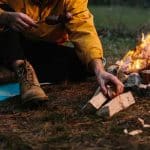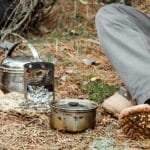Bushcraft and survival skills are essential for anyone who wants to explore the outdoors. This is why I am writing this article since my lengthy knowledge of bushcraft and survival has granted me access to numerous tips and tricks you can use outdoors.
Basic bushcraft and survival knowledge in a survivalist lifestyle can help you stay safe and comfortable in any environment, from the woods to the desert. With the proper knowledge and tools, you can survive in any situation.
From building a shelter in the wilderness to finding food, these skills can help you survive in any environment. In this article, we will discuss the most helpful bushcraft and survival skills that every person should learn.
The Most Helpful Bushcraft And Survival Skills
Bushcraft survival skills involve a range of activities such as shelter building, fire making, navigation, foraging, trapping, and more. Learning these skills will give you the confidence to explore nature with peace of mind knowing that you have the necessary skills to stay safe and comfortable in any environment.
1. Building fire
Fire is one of the most important skills to have when it comes to bushcraft. It is essential for keeping warm, cooking food, and providing light in the dark. Building fire requires knowledge about kindling, tinder, and fuel as well as having the right tools such as a knife and flint. Knowing how to build a fire in different environments can be a life-saving skill when out in the wilderness.
2. Making a shelter
One of the most important skills for a bushcrafter is being able to make a shelter. Whether it’s an emergency shelter or a permanent structure, having the knowledge and ability to construct a safe and secure shelter is essential for any bushcrafter. With the right tools and materials, you can build anything from a simple tarp shelter to an elaborate log cabin.
3. Purifying water
Knowing how to purify water is an invaluable skill that every bushcrafter should master in order to stay safe and healthy while exploring the outdoors. Additionally, it’s important to know how to filter out impurities from collected water as well as store it safely for long-term use.
4. Collecting water
Knowing how to collect, filter, and store water is essential for any bushcrafter. It can mean the difference between life and death in an emergency situation.
Learning how to collect water requires knowledge of different techniques such as rainwater harvesting, well digging, spring collecting, or even just finding sources of uncontaminated water.
5. Foraging
Foraging is an essential skill for bushcrafting, as it allows you to identify and collect edible plants and other resources from the wild. It allows you to find and harvest edible plants, fruits, nuts, mushrooms, and other natural resources that can provide sustenance while out in the wild.
Additionally, it teaches you how to identify and distinguish between edible and poisonous plants as well as how to safely prepare them for consumption. By learning how to forage, you can save money on groceries, gain a better understanding of your environment, and even find yourself in a survival situation.
6. Navigation
Knowing how to read a map and use a compass helps you find your way around unfamiliar terrain and helps you stay safe in the wilderness. It also allows you to find resources such as food, water, and shelter. With proper navigation skills, bushcrafters can make their way through any terrain without getting lost or disoriented.
7. First aid
Knowing how to treat minor injuries and illnesses can help ensure that you and your group stay safe in the wilderness. With proper first aid training, you can be prepared for any situation that may arise while out in nature. Having this knowledge will also give you peace of mind, knowing that you are able to take care of yourself and others if needed.
8. Using blades
Using a variety of tools, such as knives, axes, and saws, to build shelters, make fires, and process food is a normal thing for survivalists. Yes, you will need to know how to use an axe, if you plan on living off the grid.
Blades are versatile tools that can be used to cut wood for shelter construction, carve spoons and bowls from wood, process food like game animals or fish, and even create weapons for self-defense.
9. Fishing
Not only does fishing provide a source of food, but it also teaches important survival skills such as patience and the ability to read the environment. It also encourages an appreciation of nature, as well as helping to build confidence and self-reliance. For those who want to become proficient in bushcrafting, learning how to fish is a must.
10. Sharpening
This might sound basic, but this is an important part of the bushcraft and survival skills list! One of the most important skills for bushcrafters is sharpening blades. Knowing how to sharpen a blade correctly can make all the difference between success and failure in the wild.
It is essential to have a sharp blade when you are out in the wilderness because it will help you cut through wood, fabric, rope, and other materials more easily. Sharpening blades also help to reduce fatigue and ensure safety when using tools in bushcraft activities.
Other Bushcraft Skills That Might Come In Handy
With these skills, you can survive in any environment, no matter how hostile it may be. From navigating your way through a dense forest to finding clean water sources, bushcraft skills will help you stay safe and well-equipped in any situation. Here are a few:
- Making tools
- Hiding
- Camouflage
- Survival gardening
- Navigation
- Flint knapping
- Trapping
- Stropping
- Hunting
- Canoeing
- Reading footsteps
- Knots
- Skinning
- Cleaning
- Gutting
- Tracking
- Using rope
- Crossing water
- Finding water
- Building a fireplace
- Insect repelling
- Carving
- Smoking meat
- Food preservation
- Food cleaning
- Blacksmithing
- Medicinal plants
- Signalisation/Communication
- Communication with rescuers
- Survival signaling
- Mental attitude training
- Weather forecasting
- Creating tools
- Making weapons
- Tool repair
- Clothes repair
- Risk assessment
- Locating a good campsite
- Cooking on a campfire
- Morse code
Skills FAQs
Other bushcraft articles will tell you how to make a bushcraft raft, how to get long grass in the survivalist, and what type of map is best used for bushcraft, but let’s focus on a few questions you might still have.
What are bushcraft skills for survival?
Bushcraft skills are the knowledge and techniques used for surviving in the wilderness. They include everything from building shelters to foraging for food, identifying plants and animals, and making tools from natural materials. Bushcraft skills are essential for anyone who wants to venture into the outdoors with confidence.
What is the difference between bushcraft and survival?
Bushcraft and survival are two related yet distinct activities that involve the knowledge, skills, and techniques necessary to thrive in a natural environment.
While bushcraft is the art of living in the wilderness using primitive tools, survival is the practice of staying alive in an emergency situation. Both activities require different sets of knowledge and skills to be successful, but they share some common principles such as self-reliance, resourcefulness, and improvisation.
What is the most important bushcraft tool?
While there are many bushcraft tools available, one of the most important is the knife. A good-quality knife can be used for many tasks such as cutting wood, preparing food, and skinning animals. It is also an essential tool for self-defense in emergency situations. Therefore, a reliable knife should be at the top of any bushcraft enthusiast’s list when it comes to choosing their most important tool.
What size knife is best for bushcraft?
The ideal size of a knife for bushcraft is between 3 to 5 inches. When it comes to bushcraft, the size of your knife can make a huge difference.
This size allows you to do everything from cutting small branches and whittling wood, to slicing and skinning animals. A knife with this size blade will also be easy to carry around without being too cumbersome or heavy.
What is a survivalist lifestyle?
The term “survivalist” has come to mean someone who is prepared for any kind of disaster or emergency. A survivalist lifestyle is a way of life that focuses on being self-sufficient and prepared for any kind of disaster, natural or man-made. It involves having the skills, knowledge, and resources to be able to survive in any situation.
Conclusion
The skills listed are not only useful in extreme situations but also in everyday life. Knowing how to make a fire or build a shelter can come in handy when camping or hiking. Additionally, learning these skills can give you a sense of confidence that comes with being able to take care of yourself in any situation.
Bushcraft and survival skills are essential for anyone who wants to be prepared for any situation. They can help you stay safe, find food, and build a shelter in the wilderness. With the right knowledge and practice, you can become an expert in bushcraft and survival skills.




